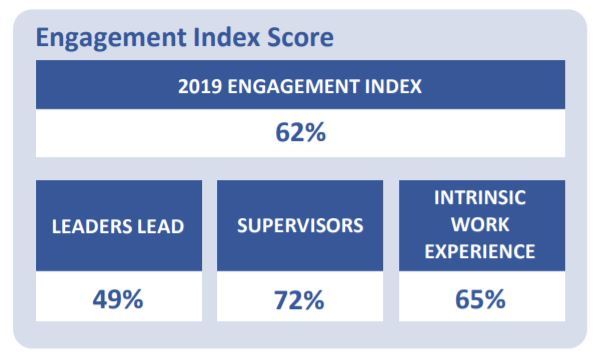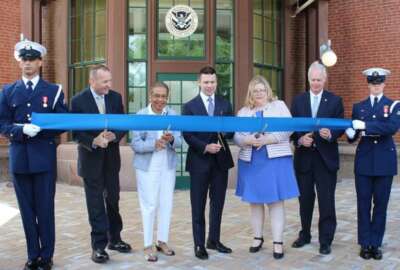Exclusive
With FEVS scores on the upswing at DHS, Alles seeks to continue the climb
Randolph “Tex” Alles, the acting undersecretary for management at DHS, said through initiatives such as the St. Elizabeth’s consolidation and employee...
A common refrain you often hear in government is the need for federal managers to be efficient and effective.
At the Homeland Security Department, that old adage is flipped.
Randolph “Tex” Alles, the acting undersecretary for management at DHS, said he expects DHS managers to be effective first, and efficient a close second.
“I want to deliver the mission as effective and efficiently as possible. The financial component is strong, but also the fact that the taxpayers are expecting us to adequately perform the mission that is why they are spending money on us,” Alles said in an exclusive interview with Federal News Network. “So it’s not just the around the idea of saving money, it’s also around mission effectiveness. So that does affect how I think about things in this undersecretary role.”

Alles, who took over the the deputy undersecretary role in July and quickly became the acting undersecretary, has been with DHS since 2011 serving in an assortment of roles at the Customs and Border Protection directorate and as the director of the Secret Service. He joined DHS after retiring from the Marine Corps as a major general after 35 years of service.
So that is where much of his mission-focused perspective comes from, and every initiative starts with that idea.
He said the management directorate is providing oversight and insight for how the technology, procurement, human capital and financial management communities are ensuring mission effectiveness.
“We are looking at areas where we can deliver the mission better and save money at the same time,” Alles said. “An example of that might be what we are doing at St. Elizabeth’s in terms of consolidation. We have a lot of leases across the National Capital Region. We actually are one of the largest GSA landholders in the NCR region so consolidating not only improves your efficiency, but also your effectiveness. You will save money, all your employees are centralized and you get them on a campus that’s more optimized for their work conditions.”
DHS’s consolidation effort took a minor hit when it decided not to move FEMA to St. E’s in the short term. Alles said that circumstances remain “a little bit of an unknown on the FEMA side,” but added that the agency is looking for long-term leasing options for FEMA. Those options include extending the lease on office space it currently occupies in Southwest D.C. or moving FEMA personnel to the National Capital Region Building that GSA owns near L’Enfant Plaza.
“We’re not entirely sure we can renew the lease at the current location, and if that does not occur, we’ll have to look for new commercial property. And that may or may not be in the NCR,” Alles said.
DHS currently has more than 5,000 employees working on the St. Elizabeth’s campus and the goal is to bring several other organizations on the grounds in the coming years.
“Our intent here is to move more of the department out here. So starting here in 2020, we have a new edition that’s just about complete, that’s going to move the Office of Civil Rights and Civil Liberties the Privacy Office, the Intelligence and Analysis front office, and the chief information officer computer support facility out here onto the campus,” Alles said. “After that, we’re optimizing the Monroe building and we’re going to move our Weapons of Mass Destruction office into that building along with the Coast Guard. And then we have several new constructions planned here coming in the coming years.”
By 2024 Alles said the St. E’s campus would include the Cybersecurity and Infrastructure Security Agency headquarters and the entire Intelligence and Analysis organization. He said DHS would be completely out of the Nebraska Avenue complex, which will be returned to GSA by the end of 2024. And by 2025, Alles said DHS would have about 13,000 employees on the St. E’s campus, including some CBP and Immigration and Customs Enforcement offices.
St. Elizabeth’s has been a tough road for more than a decade as Congress failed to fund the effort for several years and then grew frustrated by DHS and GSA’s slow efforts.
But DHS seems to have turned the corner of the consolidation effort.
Alles said DHS recognizes the change that comes with moving to a new location and is using that opportunity to continue to improve employee engagement.
In the latest Federal Employee Viewpoint Survey, employee engagement across DHS increased by 2% over the previous year, while the governmentwide overall satisfaction was flat.

“Given that it was a year of turmoil in many ways for the department, just in terms of all the issues that are surrounding that, and the issues you see on the news, but nevertheless, we’ve seen a 2% increase,” Alles said. “I noticed the Secret Service had a 7% increase in their employee engagement index. So I think that’s also not inconsequential. As I think about improving employee engagement, while most of that lies with the components and with the component heads, I think there are a number of things we can do to help our employees in terms of making their lives easier and also, in terms of caring for them better.”
Alles said he wants to bring his experience from the Marine Corps around family readiness and caring for the families to DHS.
“There’s a number of areas that we’re looking at to make improvements there. One is dependent care. How do you address that? How do you and not just not only for children, but also for extended family members? How do you look at issues in mental health? How can we assist there? How can we help folks in terms of their financial literacy to make sure they’re prepared for financial challenges?” he said. “So there are a lot of areas that we can care for employees and, then of course, the environment they work in as a critical part to which links to that whole master plan that I just talked about and already put agencies in the future. So we’re trying to think more in those terms there, how we care for them. And that’s just an overall business for the department, and particularly working down with the components.”
DHS already seems to be doing well in some of these employee support areas. The FEVS results show 73% of employees say their supervisor supports their work-life balance, but at the same time only 47% say senior leaders demonstrate support for work-life programs.
Alles said the FEVS results are even more encouraging given the challenges the agency has faced.
“I think that a lot of things occur in the news and the management staff are affected by that as some would suppose,” he said. “We do our best to make sure that we’re just focusing on the mission. We’re performing the essential nature of it. So I don’t see them as much drawn into it, though certainly they’re in DHS and you can’t deny that they’re going to be impacted.”
Copyright © 2025 Federal News Network. All rights reserved. This website is not intended for users located within the European Economic Area.
Jason Miller is executive editor of Federal News Network and directs news coverage on the people, policy and programs of the federal government.
Follow @jmillerWFED
Related Stories





